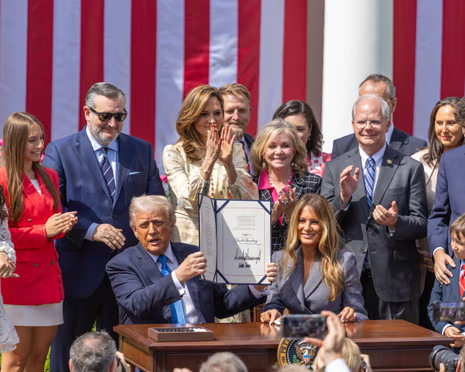On May 19, 2025, President Donald Trump signed the Take It Down Act into law, marking a significant federal effort to combat the spread of non-consensual intimate imagery and AI-generated deepfakes. Championed by First Lady Melania Trump and introduced by Senators Ted Cruz (R-TX) and Amy Klobuchar (D-MN), the bipartisan legislation aims to protect individuals from the unauthorized distribution of explicit content online.
Understanding the Take It Down Act
The Take It Down Act criminalizes the knowing publication or threat to publish intimate images without consent, encompassing both real and AI-generated content. Key provisions include:
- Mandating online platforms to remove reported content within 48 hours of notification.
- Requiring platforms to prevent the reappearance of such content.
- Imposing stricter penalties for violations, especially those involving minors.
This law represents a rare instance of federal regulation imposing obligations on internet companies to address harmful content proactively.
The Role of First Lady Melania Trump
First Lady Melania Trump played a pivotal role in advocating for the legislation. In March 2025, she lobbied on Capitol Hill, emphasizing the emotional and psychological toll on teenagers, particularly girls, who fall victim to such exploitative practices. Her involvement underscores a continued commitment to her “Be Best” initiative, focusing on children’s well-being in the digital age.
Support and Criticism
The Act garnered overwhelming bipartisan support, passing the House with a 409-2 vote and unanimously in the Senate. Supporters, including tech companies like Meta and advocacy groups, hailed it as a necessary step to protect victims and hold perpetrators accountable. However, some civil liberties organizations express concern over potential First Amendment implications. Critics argue that the law’s broad language could lead to over-censorship and infringe upon free speech rights.
Looking Ahead
The enactment of the Take It Down Act signifies a proactive approach by the federal government to address the challenges posed by emerging technologies like AI in the realm of personal privacy and consent. As digital platforms continue to evolve, ongoing dialogue and potential legislative refinements may be necessary to balance the protection of individual rights with the preservation of free expression.
REFERENCES:
- https://apnews.com/article/c7416b4935f8ccac9fd2909e494da9f1?utm_source=chatgpt.com “Trump signs a bill to make posting ‘revenge porn’ a federal crime. He had the first lady sign, too”
- https://apnews.com/article/741a6e525e81e5e3d8843aac20de8615?utm_source=chatgpt.com “President Trump Signs Take It Down Act, addressing nonconsensual deepfakes. What is it?”
- https://apnews.com/article/take-it-down-deepfake-trump-melania-first-amendment-741a6e525e81e5e3d8843aac20de8615?utm_source=chatgpt.com “Trump signs the Take It Down Act. What is it? – AP News”
- https://en.wikipedia.org/wiki/TAKE_IT_DOWN_Act?utm_source=chatgpt.com “TAKE IT DOWN Act”

